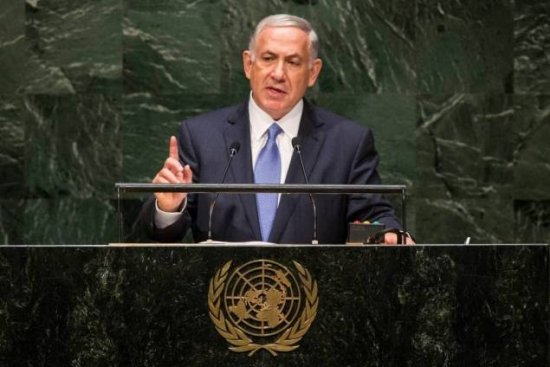 For Israeli Prime Minister Benjamin Netanyahu, Iran and the Islamic State, also known as ISIS, are essentially the same thing.
For Israeli Prime Minister Benjamin Netanyahu, Iran and the Islamic State, also known as ISIS, are essentially the same thing.
During a diatribe against Iran in his United Nations speech on Monday, Netanyahu asked: “Would you let ISIS enrich uranium? Would you let ISIS build a heavy water reactor? Would you let ISIS develop intercontinental ballistic missiles? Of course you wouldn’t.”
It was almost as if Netanyahu views Iran and ISIS as interchangeable. But the rest of the world doesn’t see it that way — least of all the United States, which is making a crucial last push for a comprehensive agreement with Iran on its nuclear program, even as it musters an international coalition to fight the Islamic State.
In insisting that Iran and ISIS are essentially the same enemy, Netanyahu broadcast his isolation among world leaders and underscored the jadedness of the idea that he has championed for most of his political career: the imminence of an Iranian nuclear bomb and the apocalyptic threat it would pose to the free world.
After all these years, Netanyahu still calls for every nook and cranny of Iran’s nuclear program to bedemolished by military force, though preferably not Israel’s alone.
The isolation of his views was evidenced not only by the near-empty General Assembly hall when he gave his speech, but also in the Israeli media.
Although the Islamic Republic of Iran (which Netanyahu persistently, if not naggingly, referred to as “The Islamic State of Iran”) was referenced in Netanyahu’s speech many more times than ISIS, the Israeli media did not follow suit.
They instead focused on Netanyahu’s appeal to “moderate” Arab states to unite against common threats, including militant Islam. A few outlets looked at Netanyahu’s riposte to Palestinian leader Mahmoud Abbas’ charges of genocide. And even the most pro-Netanyahu daily, Yisrael Hayom, led with a headline proclaiming the Israeli Defense Forces to be “the most moral army in the world”– a quote from the speech, but not about the Islamic Republic’s nuclear project.
The Israeli media’s disinterest in Netanyahu’s Iran obsession is matched at home. In poll after poll, Israelis consistently put Iran behind such concerns as street crime and the rising cost of living.
Netanyahu’s fixation on Iran has also deepened divisions between Israel’s political leadership and top military brass. The nadir was reached in 2010, when Netanyahu and then-Defense Minister Ehud Barak ordered the army to stand by for an imminent attack on Iran and the chief of staffrefused to comply.
Former Mossad chief Meir Dagan, who related the incident two years later, added that he’d never before seen the entire political leadership adamantly insisting on one course of action and the entire professional military leadership absolutely opposing it.
Four years on, the issue still festers. At the peak of the war in Gaza this summer, analyst Shlomi Eldar accused Netanyahu of all but turning a blind eye to Hamas’ tunnels that formed a pretext for the ground incursion. The reason for this, Eldar charged, was that the prime minister was completely “obsessed” with Iran.
Netanyahu’s absolutist approach to Iran is also straining Israel’s bond with the United States. For all the grandeur, courtesy and genuine complexity that feed into the staple American reference to Israel as an ally, the relationship between the two is, on the strategic level, fundamentally that of a patron power and a client state.
The client retains its value only so long as it aligns itself with the interests of its patron — or at the very least tries not to undermine them. On Iran, however, Netanyahu has repeatedly attempted to dictate to America what its interests should be in trying to hamstring his patron’s push toward a nuclear deal with Iran.
Such an agreement could radically shift the power paradigm in the Middle East toward a more open, less violent and more consensus-based arrangement. Would Israel see itself as a player in this new arrangement or outside it?
Depends on who you ask.
The relative silence of most Israeli institutions on the talks on Iran’s nuclear program suggests they are reluctant to make themselves entirely external to the potential new paradigm. But Netanyahu’s speech — intransigent as it was – indicates that at least one Israeli leader will go down fighting rather than bring Israel on board.
By Reuters
The Iran Project is not responsible for the content of quoted articles.

 QR code
QR code